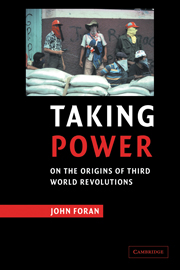Book contents
2 - The great social revolutions
Published online by Cambridge University Press: 22 September 2009
Summary
No misunderstanding of Marx is more grotesque than the one which suggests that he expected a revolution exclusively in the advanced industrial countries of the West.
Eric Hobsbawm, “Introduction,” to Karl Marx, Pre-capitalist Economic Formations (New York: International, 1964), 49.The list of the undisputed social revolutions of the twentieth century is a short one – Russia in 1917, China in 1949, Cuba in 1959. To this list I propose to add three more: the Mexican revolution of 1910–20, the Iranian of 1979, and the Nicaraguan of the same year. But for the Sandinistas falling from power (through the unprecedented medium of elections in 1990), the last choice would be uncontroversial. The Mexican and Iranian cases, as was noted in Chapter One, have their doubters because, in the absence of a socialist agenda in either case, and given the defeat of the most radical forces in each (Zapata and Villa, the Iranian left), the degree of social transformation that followed fell clearly short of its potential. But each undid a dictatorship and launched (or furthered) substantial projects of economic and social change. If the French revolution was a social revolution, then so were the Mexican and Iranian.
Absent from this list are a few other cases, some of which will be treated later in this book.
- Type
- Chapter
- Information
- Taking PowerOn the Origins of Third World Revolutions, pp. 33 - 87Publisher: Cambridge University PressPrint publication year: 2005

